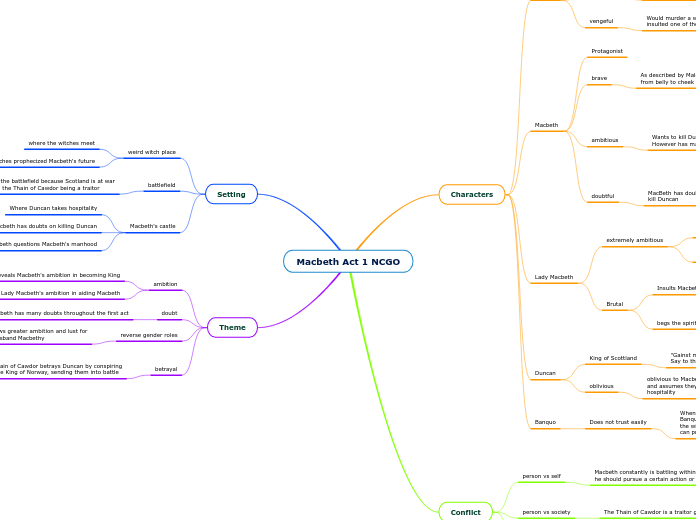Macbeth Act 1 NCGO
Characters
witches
wise
Can see into the future in a way, prophersize Macbeth's
future of being trhe Thaine of Cawdor
powerful
Can use their supernatural powers to commit
horrible deeds
"I’ll drain him dry as hay.
Sleep shall neither night nor day
Hang upon his penthouse lid."
vengeful
Would murder a woman's husband because she did
insulted one of the witches
"But in a sieve I’ll thither sail,
And, like a rat without a tail,
I’ll do, I’ll do, and I’ll do. " (ACT I, SCENE II, 10-12)
Macbeth
Protagonist
brave
As described by Malcom, Macbeth is brave for cutting a man
from belly to cheek
"For brave Macbeth,—well he deserves that name,—
Disdaining fortune, with his brandish’d steel,
Which smok’d with bloody execution, " (ACT I. SCENE II, 20-22)
Macbeth is brave enough to commit bloodshed
ambitious
Wants to kill Duncan or kill Malcom to rise above his station,
However has many doubts
"If chance will have me king, why, chance may crown me,
Without my stir. " (ACT I, SCENE III, 156-157)
"The Prince of Cumberland! that is a step
On which I must fall down, or else o’er-leap,
For in my way it lies. Stars, hide your fires!
Let not light see my black and deep desires;
The eye wink at the hand; yet let that be
Which the eye fears, when it is done, to see." (ACT I, SCENE IV, 58-64)
Macbeth decides on whether he should step down or
jump ahead of the other "next in line"'s and kill Malcom
doubtful
MacBeth has doubts on whether or not he should
kill Duncan
Lady Macbeth
extremely ambitious
Attempts to Pursuade Macbeth to go through
killing Duncan
would commit the act of killing Duncan herself
if she were not a woman
Brutal
Insults Macbeth's "manhood"
"What beast was’t, then,
That made you break this enterprise to me?
When you durst do it then you were a man;" (ACT I, SCENE VII, 55-57)
begs the spirits to "unsex" her
"unsex me here,
And fill me from the crown to the toe top full
Of direst cruelty;"
Lady Macbeth wishes she is a man to fuel her ambition and
kill Duncan
Duncan
King of Scottland
"Gainst my captivity. Hail, brave friend!
Say to the king the knowledge of the broil"
oblivious
oblivious to Macbeth and Lady Macbeth's true intentions,
and assumes they are kind people to provide him with hospitality
Banquo
Does not trust easily
When the witches speak of Maxbeth's future,
Banquo believes he is hallucinating, and asks
the witches to tell Banquo his future if they really
can predict it.
"th' name of truth,
Are ye fantastical, or that indeed
Which outwardly ye show?" (1*3*56-57)
Conflict
person vs self
Macbeth constantly is battling within himself on whether
he should pursue a certain action or not
internal battle between whether he should Kill Malcom
and become a prince or give up the throne
internal battle on whether he should Kill Duncan and if
it's right for the people or not
person vs society
The Thain of Cawdor is a traitor going agianst Duncan
person vs person
Macbeth informs Lady Macbeth on how he does not
want to kill Duncan anymore
Lady Macbeth argues with Macbeth on this, claiming
he does not have a spark of manhood since he does not
want to kill Duncan anymore
Duncan, king of Scottland is at war with the King of Norway
Setting
weird witch place
where the witches meet
witches prophecized Macbeth's future
battlefield
Duncan appears at the battlefield because Scotland is at war
with Norway due to the Thain of Cawdor being a traitor
Macbeth's castle
Where Duncan takes hospitality
Macbeth has doubts on killing Duncan
Lady Macbeth questions Macbeth's manhood
Theme
ambition
Reveals Macbeth's ambition in becoming King
Reveals Lady Macbeth's ambition in aiding Macbeth
doubt
Macbeth has many doubts throughout the first act
reverse gender roles
Lady Macbeth shows greater ambition and lust for
power than her husband Macbethy
betrayal
The Thain of Cawdor betrays Duncan by conspiring
with the King of Norway, sending them into battle
"Norway himself,
With terrible numbers,
Assisted by that most disloyal traitor,
The Thane of Cawdor, began a dismal conflict;" (AC I, SCENE II, 61-64)
